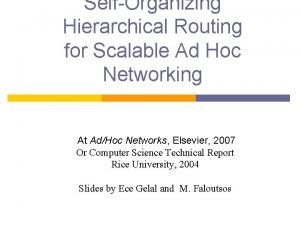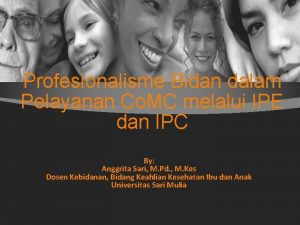Addressing the Opioid Use Epidemic Strategies for Interprofessional

- Slides: 1

Addressing the Opioid Use Epidemic: Strategies for Interprofessional Health Education Hez Naylor, MSN, FNP-BC, AP-PMN; Jennifer Jessen, Ed. D, RN; Cindy Hadenfeldt, Ed. D, RN; Sara Banzhaf, DNP, APRN-NP, PMHNP-BC; & Kate Martens Stricklett, MS, NHA BACKGROUND • Opioid Use Disorder has globally impacted families with loss of life and devastating financial and social consequences. • To assist health profession students understand the complexities of the epidemic and the value of an interprofessional approach, an online program was implemented. • Students from Nursing, Medicine, Pharmacy, Dental, Physical Therapy, Occupational Therapy, Emergency Medical Services and Public Health participated. PURPOSE • To explore health professional students’ perception of patients experiencing Opioid Use Disorder and challenges of interprofessional care. METHODS &SAMPLE • 217 participants completed an online activity. • A representative sample of 50 participants’ discussion posts was analyzed. • Multiple health professions participated in a one-week online course. • Four required pre-recorded lectures by professionals in family medicine, pain management, mental health, and emergency medical services. • Recordings focused on factors contributing to the opioid crisis, management of acute overdose, and strategies for a comprehensive, holistic approach to individuals with chronic pain and opioid use disorder. • Two patients in unfolding case studies including Ellie, a young female athlete who became addicted to opioids after a sports injury, and Mark, a 40 -year-old business main with severe chronic pain. • Thematic analysis was applied to the case study. ACTIVITY TIMELINE – ONE WEEK: THE COMMUNITY OF INQUIRY MODEL • Used as the framework for this study, this model emphasizes social, cognitive, and teaching presence as essential components of meaningful educational experience in the online learning community. CASE STUDY SUBJECTS: Mark Ellie RESULTS Themes – Six Identified “Opioid use disorder can happen to anyone. ” “Ineffective pain management contributes to opioid addition. ” “Overwhelming life stressors can impact opioid use. ” “Seeking relief from chronic pain can dominate a person’s life. ” “A strong sense of empathy and compassion is essential for health care professionals. ” “Interprofessional collaboration for better outcomes. ” CONCLUSIONS • Student satisfaction with the activity was high, with 93% of participants reporting the activity was valuable to their learning. “This activity has drastically impacted how I will treat my future patients. ” • The activity was easy to administer in the online environment. • A majority of respondents also felt the interprofessional component was valuable: • “Reading other comments from students in various professional schools was eye opening. Different aspects of the case studies stuck out to different professionals. It was a good example of how we each have something valuable to contribute to the care process. ” • “I believe that the opioid epidemic started unintentionally with the health care system, and it will take all health care professionals working together to end it. ” REFERENCES Garrison, D. R. (2011). Prescription opioids • Garrison, D. R. (2011). E-learning in the 21 st Century: A Framework for Research and Practice (New York: Routledge), 22.

